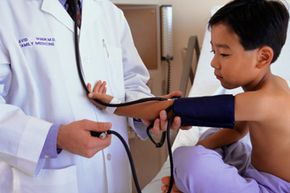 “It is important for kids and adults to get a physical every year.Keith Brofsky/Thinkstock
“It is important for kids and adults to get a physical every year.Keith Brofsky/Thinkstock
Let’s see. No. 2 pencils? Check. New school clothes? All set. Check fine-motor development. Really?
If that last one isn’t on your back-to-school checklist you’re forgetting one of the most important things about the back to school season: wellness checkups.
Kids from preschool through high school should have annual physicals, everything from visits to the pediatrician to the dentist to eye exams to be sure they can read the chalkboard. There are five main things to know about back-to-school physicals, and here we’ll begin with what to expect with from a basic physical exam.
Contents
- Routine Physical
- Medical History
- Preventative Screening
- Behavioral Development
- Immunizations
5: Routine Physical
Physical exams will vary from age to age and from doctor to doctor (and sometimes with variance from your health insurance plan) but the basics of a back-to-school physical start with the routine exam based on guidelines set by the American Academy of Pediatrics. Physicians take this opportunity to do a comprehensive check of your child’s body. This usually includes recording height and weight, taking blood pressure and pulse readings, and checking heart and lungs, abdomen, as well as skin, eyes, ears, nose, mouth, teeth and throat.
The doctor will also screen for scoliosis, hernia and overall level of physical maturity. Reflexes, fine-motor development (such as tying shoes) and gross-motor development (such as jumping) is usually on the docket as well.
4: Medical History
Reviewing your child’s and your family’s medical history with your pediatrician during a back-to-school physical is important for detecting patterns of disease and chronic illness that run in your family. Often there is paperwork for you to fill out before the appointment, so it’s better to come prepared.
During this part of the visit doctor and patient (and parents, too, depending on your child’s age) will talk about current medical conditions such as allergies (bee stings to food allergies) and illnesses (such as asthma or diabetes). Parents should make sure to reveal any hospitalizations, surgeries or prior injuries, and what serious illnesses family members have or have had (such as cancer and heart disease). After all, early detection can mean prevention.
You should also have a list of medications your child takes, including prescription medications, over-the-counter medicines, including baby aspirin, and supplements. Know dosages and include those in your paperwork.
3: Preventative Screening
Annual wellness visits give doctors the opportunity to check kids for illnesses and chronic diseases in early childhood when they may be easier to treat or even prevented. Physicians can then more easily monitor your child’s overall wellness with routine examinations and tests including blood tests to screen for such problems as high cholesterol levels, diabetes and lead poisoning. They might also do skin tests for things such as tuberculosis.
Preventative screening appointments are also a good time for you and your child to talk to your physician about safety. Depending on your child’s age, that may mean everything from bicycle helmet safety to concerns about alcohol, drugs, cigarettes and sexual activity.
2: Behavioral Development
Because a healthy mind is just as important as a healthy body, many pediatricians take time during annual back-to-school physicals to assess kids’ behavioral and intellectual development. Your physician may ask you and your child questions to evaluate self-esteem, ask about grades and schoolwork, and how your child copes with anger and disappointment. You may be asked if there are any changes at home that may affect your child’s behavior.
Motor and language skills should also be assessed, and teens may be screened for depression, drug abuse and asked about sexual activity. Parents should always be comfortable asking for time alone with the doctor for any additional questions or to address other concerns.
1: Immunizations
Schools require that kids have certain immunizations before they can attend. Most vaccinations are given before kids turn two but school-aged children can expect booster shots during their annual visit to the pediatrician.
Many doctors recommend the following immunizations: Hepatitis B vaccine (HBV), Hepatitis A (HAV), pneumococcal conjugate vaccine (PCV), DTaP (diphtheria, tetanus and petussis), Haemophilus influenzae type b bacteria (Hib), inactivated poliovirus vaccine (IPV), MMR (measles, mumps, rubella), varicella (chickenpox), MCV4 (meningitis), rotavirus, human papillomavirus (HPV), and influenza.
Some immunizations may cause discomfort, pain or fever so be armed with acetaminophen or ibuprofen (with doctor’s approval, of course).
Why Shouldn’t We Vaccinate Our Children?
Some parents are uncomfortable having their children receive vaccinations because of potential risks. Our advice? Talk to your doctor and do your research to make an informed decision about what’s best for your family. Also, read this informative article by HowStuffWorks.com writer Josh Clark for more in-depth information. http://tlc.discovery.com/family/kids-health/why-shouldnt-we-vaccinate-our-children.html.






























